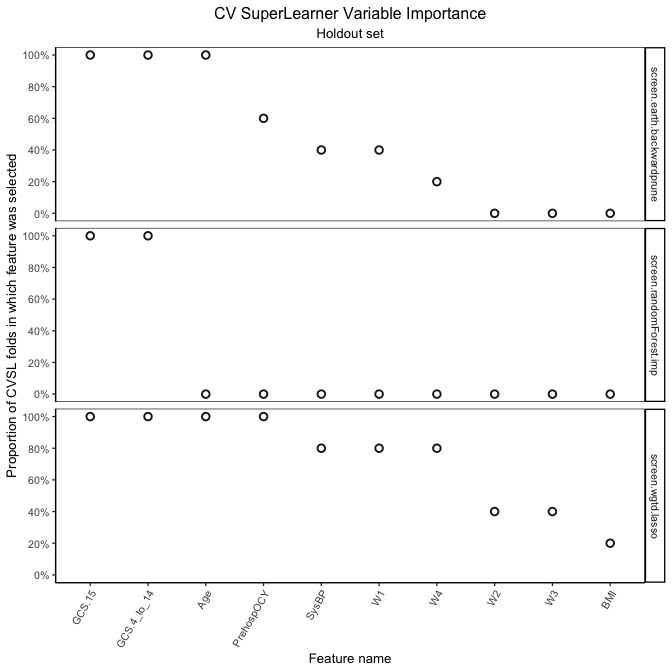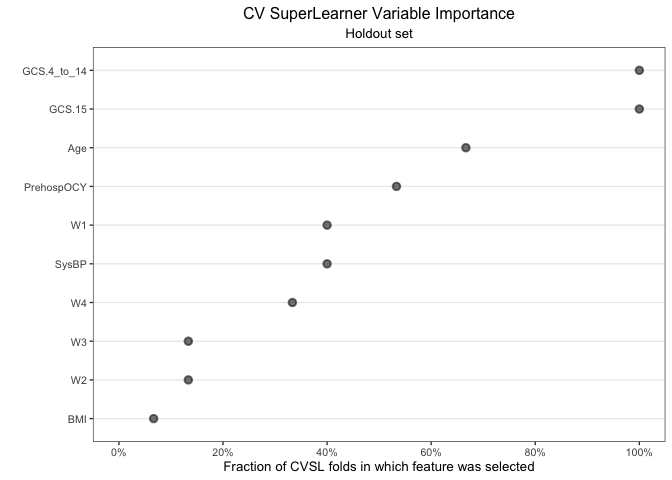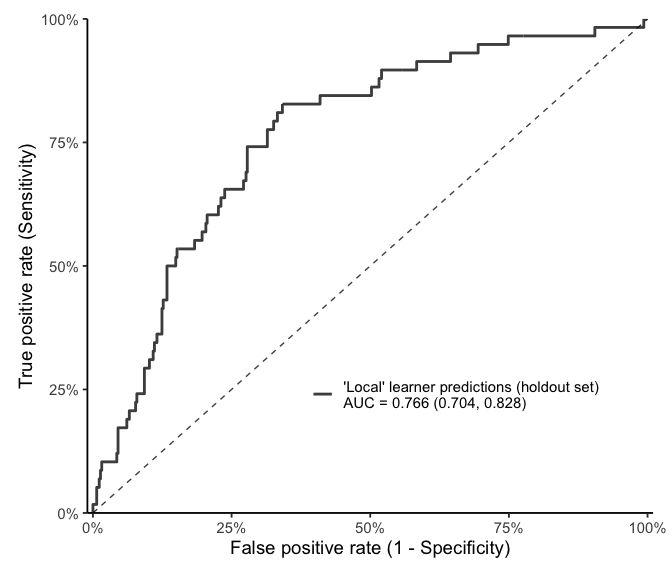The yall package implements a local learning algorithm, building upon
the ensemble learner Cross-Validated
SuperLearner
(SuperLearner::CV.SuperLearner()).
The yall package is currently only available via GitHub. To install:
remotes::install_github("saraemoore/yall")library(yall)
library(SuperSelector) # sim_proppr_data, factor_to_indicator
library(SuperLearner) # screening and prediction library algorithm functions
library(FSelector) # screening library algorithm functions
library(tidyr) # expand_grid
library(dplyr) # %>%, slice_min, select, left_join, arrange
library(caret) # createDataPartition
library(origami) # make_folds, cross_validate
library(future) # plan
libraryCVSLFeatSel <- list(
`lasso mean` = c("SL.mean", "screen.wgtd.lasso"),
`random forest biggest diff mean` = c("SL.mean", "screen.randomForest.imp"),
`splines biggest diff mean` = c("SL.mean", "screen.earth.backwardprune"),
`lasso glm` = c("SL.glm", "screen.wgtd.lasso"),
`random forest biggest diff glm` = c("SL.glm", "screen.randomForest.imp"),
`splines biggest diff glm` = c("SL.glm", "screen.earth.backwardprune")
)
libraryMetaFeatSel <- data.frame(selector = c("cutoff.biggest.diff", "cutoff.k", "cutoff.k"),
k = c(NA, 3, 6),
stringsAsFactors = FALSE)
rownames(libraryMetaFeatSel) <- c("biggest diff", "top3", "top6")
libraryNeighborWeights <- tidyr::expand_grid(norm = c("L1", "L2"),
kernel = c("uniform", "tricube"),
window = c(0.15, 0.3)) %>%
as.data.frame(stringsAsFactors = FALSE)
librarySimplePred <- list(
c("SL.glm.mean", "All"),
c("SL.glm", "screen.corRank3.wgtd"),
c("SL.glm", "screen.corRank6.wgtd")
)
methodCVSLFeatSel <- c("method.NNloglik")
nCVSLFeatSelFolds <- 5
family <- binomial()
my_seed <- 98765
n_obs <- 2000
set.seed(my_seed)proppr_sim <- SuperSelector::sim_proppr_data(n_obs = n_obs, rnd_seed = my_seed)
Y_full <- as.numeric(proppr_sim$Y)
X_full <- bind_cols(proppr_sim, as.data.frame(SuperSelector::factor_to_indicator("GCS", proppr_sim)))
X_full <- subset(X_full, select = -c(ID, Y, GCS))
# 75/25 [tuning] vs [holdout] split
valid_prop <- 0.25
holdoutIdx <- caret::createDataPartition(Y_full, times = 1, p = valid_prop)[[1]]
X_holdout <- X_full[holdoutIdx,]
Y_holdout <- Y_full[holdoutIdx]
X_tuning <- X_full[-holdoutIdx,]
Y_tuning <- Y_full[-holdoutIdx]
# within the tuning set, make CV folds
nFolds <- 5
cvFoldInfo <- origami::make_folds(X_tuning, V = nFolds)plan(sequential)
# expect this function to run for several minutes for this simulated dataset,
# particularly when executing sequentially
predres <- origami::cross_validate(
cv_fun = trainYALL,
folds = cvFoldInfo,
y_all = Y_tuning,
x_all = X_tuning,
family = family,
cvSLfeatsel_control = list(SL.library = libraryCVSLFeatSel, method = methodCVSLFeatSel,
selector.library = libraryMetaFeatSel, nFolds = nCVSLFeatSelFolds),
neighbor_control = list(library = libraryNeighborWeights),
predict_control = list(SL.library = librarySimplePred, trimLogit = 0.001),
save_fit_library = FALSE,
save_dist = FALSE,
# cross_validate() uses future by default to process each fold in parallel.
# future.packages specifies which packages to attach in the environment within each fold.
future.packages = c("SLScreenExtra"),
# .combine_control tells cross_validate() how to combine list elements from each fold's results
.combine_control = list(combiners = list(predict = combiner_rbind, screen = combiner_rbind,
screen_full = combiner_c, screen_which = combiner_rbind))
)# one row per unique combo of tuning parameter settings
predSummary <- summarizeYALL(predres$predict)
# minimum cvRiskSum (note that there may be ties):
predSummary %>% slice_min(cvRiskSum, with_ties = TRUE) %>% knitr::kable()| norm | kernel | window | screener | predictor | combo_method | selector | k | cvRiskSum |
|---|---|---|---|---|---|---|---|---|
| L2 | uniform | 0.3 | screen.corRank3.wgtd | SL.glm | NNloglik | cutoff.k | 6 | 134.8602 |
# subset predictions to only those with the settings which resulted in the min cvRiskSum
best_res_row <- predSummary %>%
slice_min(cvRiskSum, with_ties = FALSE) %>%
select(-cvRiskSum) # use the optimal parameters selected using the tuning set to predict outcomes in the holdout set
predall_holdout <- predictAllYALL(newX = X_holdout,
y_all = Y_tuning,
x_all = X_tuning,
family = family,
predSummaryRow = best_res_row,
libraryCVSLFeatSel = libraryCVSLFeatSel,
nCVSLFeatSelFolds = nCVSLFeatSelFolds)# Holdout set: Global feature selection by screening algorithm
# (via SuperSelector package)
cvSLVarImpPlot2(summarizeScreen(predall_holdout$screen,
groupCols = c("method", "screener")),
subtitle = "Holdout set",
y_breaks = seq(from = 0, to = 1, length.out = max(predall_holdout$screen$fold) + 1))# Holdout set: Global feature selection across all screening algorithms
# (via SuperSelector package)
cvSLVarImpPlot(summarizeScreen(predall_holdout$screen,
groupCols = "method"),
labelVals = FALSE,
subtitle = "Holdout set",
addSummary = FALSE,
x_breaks = seq(from = 0, to = 1, length.out = max(predall_holdout$screen$fold) + 1))ll_assessed <- assess_predictions(predall_holdout$predict$library.predict,
Y_holdout,
"'Local' learner predictions (holdout set)")# Holdout set: Receiver operating characteristic curve
library(ggplot2)
ggplot(data = ll_assessed$roc, aes(x = fpr, y = tpr, color = method)) +
geom_line(size = 1, alpha = 0.9) +
geom_segment(data = data.frame(x = 0, y = 0),
aes(x = x, y = y, xend = x + 1, yend = y + 1),
color = "black", linetype = 2, alpha = 0.75) +
scale_x_continuous("False positive rate (1 - Specificity)", limits = c(-0.01, 1.01),
labels = scales::percent, expand = c(0,0)) +
scale_y_continuous("True positive rate (Sensitivity)", limits = c(0, 1),
labels = scales::percent, expand = c(0,0)) +
scale_color_manual(NULL, values = "grey20") +
theme_classic(base_size = 14) +
theme(legend.position = c(0.65, 0.25),
plot.margin = margin(0.5, 0.5, 0.5, 0.5, "cm"))# Holdout set: Example Local Regression Model Coefficient Estimates for a single observation
library(gtsummary)
library(kableExtra)
local_mod <- predall_holdout$predict %>%
bind_cols(y_observed = Y_holdout) %>%
mutate(resid = abs(y_observed - library.predict)) %>%
slice_min(resid) %>%
pull(fitLibrary) %>%
`[[`(1)
local_coef <- tbl_regression(local_mod, exponentiate = TRUE, intercept = TRUE) %>%
modify_column_hide(columns = p.value) %>%
modify_column_unhide(columns = std.error)
as_kable_extra(local_coef, format = "pipe")| Characteristic | OR | SE | 95% CI |
|---|---|---|---|
| (Intercept) | 0.06 | 0.968 | 0.01, 0.34 |
| GCS.15 | 0.09 | 0.641 | 0.02, 0.30 |
| Age | 1.07 | 0.029 | 1.01, 1.14 |
| PrehospOCY | 0.60 | 0.327 | 0.30, 1.09 |


